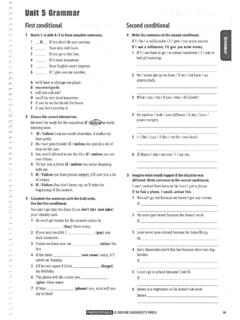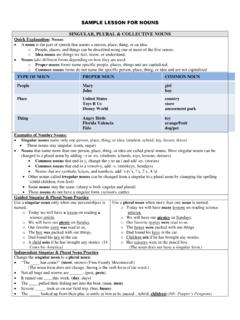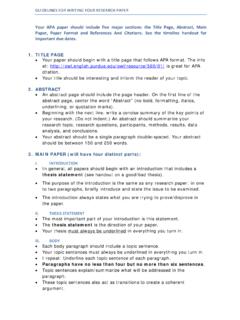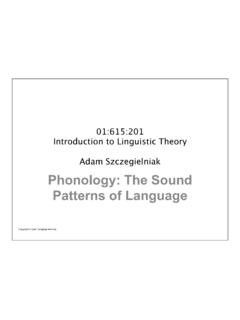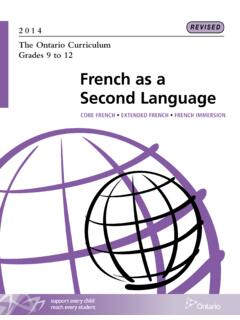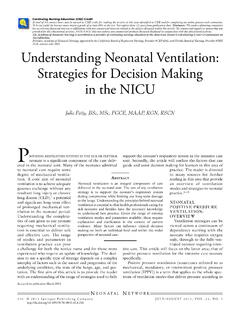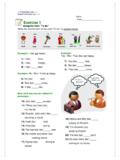Transcription of Singular & Plural Nouns - My English Classes
1 Singular & Plural Nouns Beverly Schmitt 1997-2002, all rights reservedSingular Noun Definition: When a noun means one only, it is said to be : boy, girl, book, church, boxPlural Noun Definition: When a noun means more than one, it is said to beplural. Examples: boys, girls, books, churchesRule #1 The Plural of Nouns is usually formed by adding s to a Singular : lamp, lamps; cat,cats; fork, forks; flower, flowers; pen, pensExercise: Write the Plural of each of these nounschairstarfarmstormdoorrockownerpape rcupbearRule #2 Nouns ending in s, z, x, sh, and ch form the Plural by adding : moss, mossesbuzz,buzzesbox, boxesdish, disheschurch, churchesExercise: Write the Plural of each of these nounsdressbrushhexwishclassfoxcrossbench bushaxgrassmantisglassSpecial Note:If you add s to such Nouns as fox, bush, and bench, you will find that you cannotpronounce them without making an additional syllable.
2 This is why such nounsform the Plural by adding ReviewExercise: Tell if the following Nouns are Singular or pluralboxcatsslipperforksbookschairdeskh ousespaperwagonlampsshoesgardenhorses dressdogcartskitchenponyglasschairstarpe ncilgirlboyaxbushcoattreebenchsketchowne rtouchlatchmugbellschurcheswagonscoalspi cturesclocksboxeskitchensbasinschairsday shouses pencils treestablesRule #3 Nouns ending in y preceded by a consonant is formed into a Plural by changingy to ies. Examples: lady, ladies; city, cities; army, armiesExercise: Write the Plural of the following wordsflybabyponyinjurycherryladybeauty storyhistoryberrycityskydutystudytheoryR ule #4 Nouns ending in y preceded by a vowel form their plurals by adding : boy, boys; day, daysExercise: Write the Plural of the following wordsdaytoyessayturkey chimneyplayjoyvalleyalleyvolleyRule #5 Most Nouns ending in o preceded by a consonant is formed into a Plural byadding es.
3 Example: hero; heroes; grotto, grottoesmottocalicobuffaloheropotatocarg ovolcanogrotto mosquito*tomatohalo*tornado*buffalo*port ico*veto*may add s or es Beverly Schmitt 1997-2002, all rights reserved Beverly Schmitt 1997-2002, all rights reservedThe following are among those that add s onlycantosolopianolassohalomementoalbino siroccoSpecial Note:Most Nouns ending in o preceded by a vowel is formed into a Plural by adding : folio, folios; cameo; cameos; studio, studios; portfolio, portfoliosRule #6 Some Nouns ending in f or fe are made Plural by changing f or fe to : beef, beeves; wife, wivesExercise: Write the Plural of the following wordscalfselfleafsheaflifeloafshelfhalfw olfknifeelfhalfthiefwifegulfchiefdwarf* proofturfExceptions: The following may form their plurals by adding , chiefsfife, fifes mischief, mischiefshoof, hoofsroof, roofs grief, griefskerchief, kerchiefssafe, safesIRREGULAR PLURALSman, menfoot, feetmouse, micewoman, womentooth, teeth louse, licechild, childrenox, oxengoose, geeseThe following Nouns have no Singular :scissors oatstongsdregstrouserspinchers bellowssnufferscattleshearsmeasles mumpsvictuals tweezersvespersSome Nouns are always Singular .
4 Some of these Nouns may be used in the pluralwhen different kinds are meant as sugars, coffees, cottonsgold, silver, wheat, corn, molasses, copper, sugar, cottonnews, gallows, mathematics, ethics (other words ending in ics) Singular Nouns use this and Nouns use these and those. Beverly Schmitt 1997-2002, all rights reservedSpecial note: Singular pluralson-in-lawsons-in-lawdaughter-in-l awdaughters-in-lawmaid of honormaids of honorsecretary of state secretaries of stateIn forming the Plural of proper names with a title, some pluralize the title, , the Misses pluralize the name, , the Miss a title belongs to each of the two names, it should take the s in forming theplural, , Drs. Scott. Beverly Schmitt 1997-2002, all rights reservedFlashcardsCut on solid lines and fold on the dotted Beverly Schmitt 1997-2002, all rights reserved Beverly Schmitt 1997-2002, all rights reserved Beverly Schmitt 1997-2002, all rights reserved Beverly Schmitt 1997-2002, all rights reservedSingular Noun DefinitionWhen a noun means one only, itis said to be : boy, girl, book,church, boxPlural Noun DefinitionWhen a noun means more thanone, it is said to be : boys, girls, books,churchesRule #1: The Plural of Nouns isusually formed by adding s to asingular nounExample: lamp, lamps;cat, cats; fork, forks;flower, flowers; pen, pensHow are the plurals ofmost Nouns formed?
5 Rule #2: Nouns ending in s, z,x, sh, and ch form the Plural byadding : moss, mossesbuzz, buzzes; box, boxesdish, dishes; church, churchesHow is a Plural madewhen a noun ends ins, z, x, sh, and ch? Beverly Schmitt 1997-2002, all rights reserved Beverly Schmitt 1997-2002, all rights reserved Beverly Schmitt 1997-2002, all rights reserved Beverly Schmitt 1997-2002, all rights reserved Beverly Schmitt 1997-2002, all rights reservedWhy do you add es tomake a Plural madewhen a noun ends ins, z, x, sh, and ch?If you add s to such Nouns as fox,bush, and bench, you will find thatyou cannot pronounce them withoutmaking an additional syllable. Thisis why such Nouns form the Plural byadding #3: Nouns ending in ypreceded by a consonant isformed into a Plural by changingy to : lady, ladies; city, cities;army, armies; baby, babiesHow do you form a pluralwhen a noun ends in yand is preceded by aconsonant?
6 Rule #4: Nouns ending in ypreceded by a vowel form theirplurals by adding : boy, boys; day, daysHow do you form a pluralwhen a noun ends in yand is preceded by avowel?Rule #5: Most Nouns ending in opreceded by a consonant isformed into a Plural by adding : hero; heroes; grotto, grottoesHow do you form a pluralwhen a noun ends in oand is preceded by aconsonant? Beverly Schmitt 1997-2002, all rights reserved Beverly Schmitt 1997-2002, all rights reserved Beverly Schmitt 1997-2002, all rights reserved Beverly Schmitt 1997-2002, all rights reserved Beverly Schmitt 1997-2002, all rights reservedHow do you form a pluralwhen a noun ends in oand is preceded by avowel?Most Nouns ending in o precededby a vowel is formed into a pluralby adding : folio, folios;cameo; cameos; studio, studios;portfolio, portfoliosRule #6: Some Nouns ending in for fe are made Plural by changingf or fe to : beef, beeves; wife, wivesHow do you form aplural when a nounends in f or fe?
7 Exceptions: The following mayform their plurals by adding , chiefs; fife, fifesmischief, mischiefs; hoof, hoofsroof, roofs;grief, griefsAre there any exceptionsto the f or fe to ves rule?If so, give an PLURALSman, men; woman, women;child, children; foot, feet; tooth,teeth; mouse, mice; louse, lice; ox,oxen;goose, geeseGive a couple ofexamples of irregularplurals. Beverly Schmitt 1997-2002, all rights reserved Beverly Schmitt 1997-2002, all rights reserved Beverly Schmitt 1997-2002, all rights reserved Beverly Schmitt 1997-2002, all rights reserved Beverly Schmitt 1997-2002, all rights reservednouns that have no singularscissors, oats, tongs, dregs,trousers, pinchers, bellows,snuffers, cattle, shears,measles, mumps, victuals,tweezers, vespersGive a couple ofexamples of Nouns thathave no Nouns are always , silver,wheat, corn, molasses,copper, sugar, cottonSome of these Nouns may be used inthe Plural when different kinds aremeant as sugars, coffees, cottonsGive a couple ofexamples of nounsthat are Nouns usethis and thatPlural Nouns usethese and do you use thisand that?
8 When do you usethese and those? Beverly Schmitt 1997-2002, all rights reservedNouns taken from foreign languages without change generally retain theiroriginal plurals. Singular Plural SingularPlural alumnaalumnae focusfoci formulaformulae radiusradii nebulanebulae stimulusstimuli vertebravertebrae terminustermini automatonautomata amanuensisamanuenses curriculumcurricula analysisanalyses datumdata axisaxes erratumerrata basisbases genusgenera crisiscrises gymnasiumgymnasia ellipsisellipses phenomenonphenomena hypothesishypotheses stratumstrata parenthesisparentheses alumnusalumni thesisthesesSome Nouns from foreign languages have both an English and a foreign English PluralForeign Pluralbeaubeausbeauxcherubcherubscherubi mformulaformulasformulaefocusfocusesfoci gymnasiumgymnasiumsgymnasiamemorandummem orandumsmemorandamediummediumsmediaradiu sradiusesradiispectrumspectrumsspectravo rtexvortexesvortices
